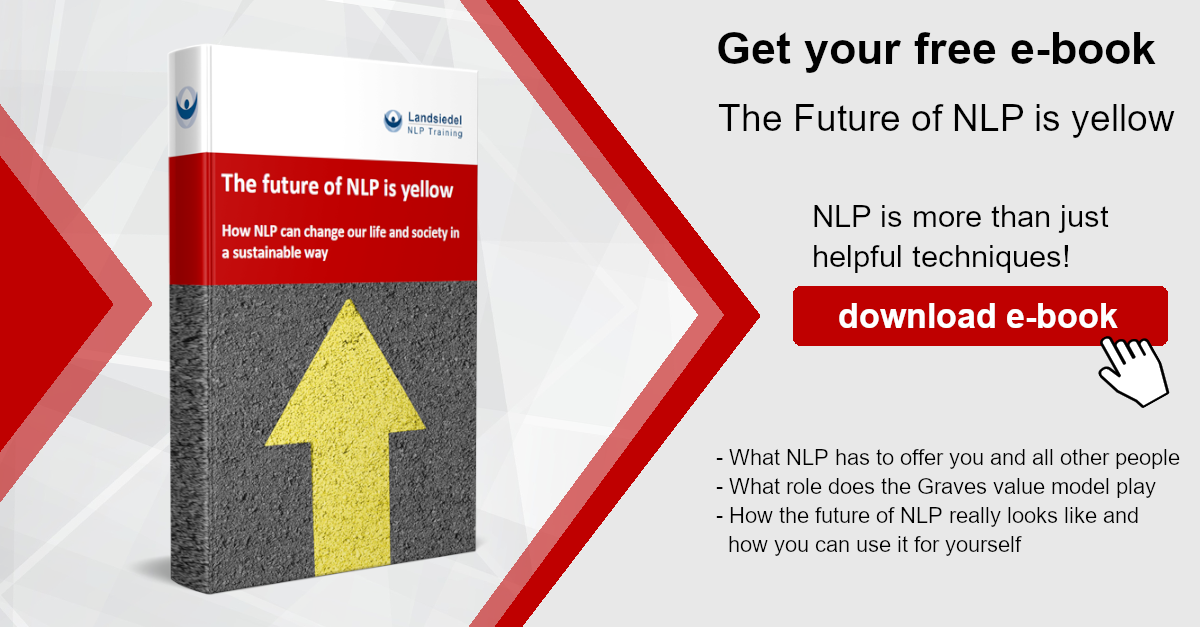NLP Coach

Overview of the NLP Coach Training according to ICI
The training as an NLP Coach according to the ICI (International Association of Coaching Institutes) provides you with the necessary skills and knowledge to be a successful coach. Coaching is the non-psycho-therapeutic counselling, support and encouragement of people in business, sports or private life.
After the NLP-Practitioner has already learned and integrated the basics of NLP for his own development process, the coaching training is now about applying the learned methods in concrete coaching contexts. The goal is to apply one's own NLP skills professionally and flexibly at the highest level.
- Role and basic understanding of a coach
- Consolidation of all NLP modules in theory and practice through application to the coaching context
- Coach profile and marketing
- Clearance of assignment and coaching contracts
- Methods and tools in coaching
- Systemic, team and conflict coaching
Participants are expected to be able to
40 hours of personal coaching experience in addition to the training. Some of these hours will be spent in a group supervision
discussed during the training. In practice, many participants enrich their coaching work with three detailed
case studies and proof of hours worked only after the training.
The participants who would like to become NLP teaching coaches, please see the necessary
Qualifications of the page "Criteria for the appointment as NLP Teaching Coach".
Prerequisites for the NLP Coach Trainings
Prerequisite for the certification of the training is a completed NLP Practitioner Training. A Master Practitioner training to obtain the degree Coach is no longer required. Participants who have already completed an NLP Master training will receive the title Master Coach.
The minimum age at the time of the certificate handover is 25 years.
Training Contents of the NLP Coach Training
Create favourable conditions
- Self-marketing
- Acquisition
- Clearance of order
- Agreement and contracts
- Code of Ethics
- Legal situation
Coach Career
- Locating
- Visions, goals and life path
- Development of a coach profile
- Personal congruence
- Self-management and self-coaching
Design of the Coaching Process
- NLP in Coaching
- NLP Coaching Structure Model
- Integration of NLP Practitioner and Master Contents
- Difference coaching - counselling - supervision
- Tools and methods
- Solution-oriented language models
- Questioning techniques: Circular questioning, systemic questioning, etc.
- Phases in the coaching process
Group, Pair and Team Coaching
- Forms of team coaching
- Neurological levels
- Conflict resolution
- Application of NLP formats to teams, e.g. Proimprinting
- Games for team development
- Couple coaching
Integration of other Models
- Systemic thinking and acting
- Principles of phenomenological constellations
- Organisational and structural constellations
- Basics of kinesiological change work
- Various psychotherapeutic approaches
- Social Panorama
- Sprial Dynamics
- Quantum psychology
Testing and Supervision
- Selfreflection
- Forms of supervision
- Developing and applying new coaching strategies
- Transfer to new orders and contexts
Further information about the NLP Coach Training
The NLP Coach Training is a professional training to become a coach. The participants receive the necessary tools to be able to carry out successful individual, pair or team coaching sessions themselves.
The prerequisite for participation in the NLP Coach Training is a completed Practitioner Training.
In the NLP Coach Training the view is directed beyond the horizon. An NLP coach is expected to have also dealt with neighbouring disciplines. Possible subject areas for the NLP Coach Training are therefore: provocative coaching, transactional analysis, Carl Rogers style of conversation, systemic and integral approaches.
Before, during and after your NLP Coach Training, the prospective coaches have the task of conducting and documenting forty coaching hours of their own. Three of these cases are then submitted in the coaching work together with a coaching profile and a coaching concept.
The NLP Coach training was created as a parallel training to the NLP Trainer training. Originally there was only the trainer training, but the strong demand for trained coaches led to the fact that the different associations reacted and created a curriculum for a coach training as well.

Training Guidelines for Coach Training
Requirements for Participants:
NLP-Practitioner, or comparable degree. Minimum age at certificate presentation: 25 years.
Duration:
compulsory minimum training time: 130 hours of time, spread over at least 18 days.
In addition, at least 40 hours of peer group work are recommended.
Supervision:
At least 15 hours of individual or group supervision by an NLP teacher trainer, DVNLP. The contents of the supervision are is derived from the 40 hours of coaching and supervision carried out by the respective participant, e.g. in peer groups. This supervision is to be understood as additional supervision and comes to the minimum 130 hours of training and the 40 hours of Coaching and supervision of the trainees.
Final paper:
Contents of the final thesis are three subject areas:
- Personal profile as a coach
- Our own coaching concept
- Three case documentations (see attached example)
The exact execution of the final thesis will be determined in writing in consultation with the trainers. Special emphasis is placed on a detailed reflection of the of the coaching sessions:
- What exactly did go well?
- Which of these could be transferred to an analogue case?
- Where exactly did disturbances occur?
- What could be done differently in an analogous case?
- Why did something not work?
- What could be done differently in an analogous case?
- Quality is more important than quantity.
Basic Attitude of the Coach:
- Basic attitude of ethical commitment to life
- Respectful treatment of different models of the world
- Respect for the otherness of people
- Human image, mission statement, ethics, attitude, integrity! See Professional Code of Conduct for Continuing Education (Forum Werteorientierung in der Weiterbildung e.V.)
Designing the Prerequisites and Framework Conditions of Coaching Processes:
- Development of an own offer profile
- Creating your own coaching concept
- self-marketing
- Acquisition
- Contract management: order clarification, agreement and contracts

Creation of coaching - relationship and interactive skills
- Creating an atmosphere that supports the coaching
- Relationship to the coachee
- ability to use covert or indirect communication in a goal-oriented way
- Allocation of tasks promoting development
- Clarification of change concerns and change approach
- Capabilities of Language use
- deepening: skills in team coaching
- Methods of conflict management
- General skills of process design
Review and supervision
- Creating a case documentation
- analysis and change of long-term processes
- ability for self-reflection
- Supervision (collegial supervision)
- Targeted expansion of the own model of the world
- skills for establishing one's own balance and personal stress management
- Integration of internal conflicts
- Personal congruence and authenticity
- Developing, learning and applying new strategies
- Transfer of experience to other assignments and contexts
